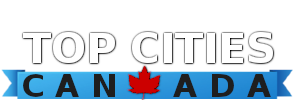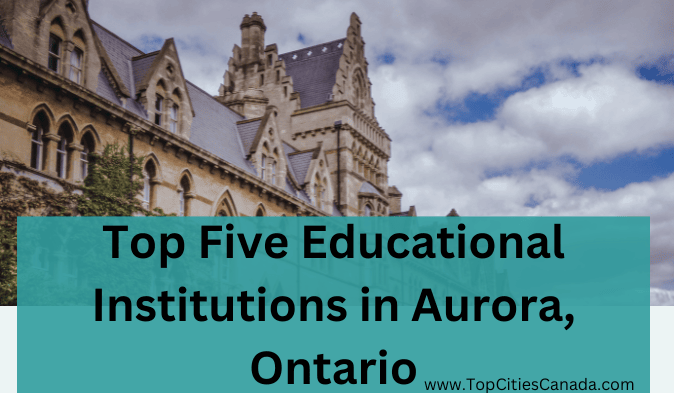Educational Institutions in Aurora: Aurora’s school system is rich and varied to meet the wants and preferences of a wide range of students. Aurora has schools for all levels, from public schools with a wide range of programs to private schools focusing on specialized education. All of these schools are helpful and interesting for students.
Aurora is a part of the York Region District School Board (YRDSB) and the York Catholic District School Board (YCDSB). These boards are in charge of public schools and Catholic schools, respectively. In most cases, these boards offer a variety of educational opportunities for kids from kindergarten to 12th grade.
Aurora also has several public and private elementary and secondary schools offering various academic and recreational activities. Since education quality can vary, it’s best to look into individual schools, see how well they’ve done, and consider any new developments or changes that may have happened recently.
Have a look at Top 5 Educational Institutions in Aurora, Ontario
St. Andrew’s College in Aurora, Ontario
St. Andrew’s College in Aurora, Ontario, Canada, is an independent boarding and day school founded in 1899. It is a university-preparatory school for boys in grades 5 to 12, emphasizing academic achievement, athletics, and leadership development.
The school is accredited by the Canadian Educational Standards Institute and affiliated with associations like CAIS, CASE, NAIS, and the International Boys’ Schools Coalition (IBSC). St. Andrew’s College has a 126-acre campus with Georgian Revival architecture and a traditional quadrangle form.
The school offers a rigorous academic curriculum with multiple Advanced Placement (AP) opportunities and a rich educational environment that includes co-curricular and extra-curricular activities.
The college’s campus has four boarding houses accommodating approximately half of the 651 enrolled boys. Notable alumni include Lawren Harris, Kiefer Sutherland, and Graham F. Towers. St. Andrew’s College strongly focuses on arts, athletics, community service, and leadership programs.
St. Andrew’s College graduates gain entry to top universities in Canada, the U.S., and abroad, known for their values, dedication to community, achievements, and lasting friendships.
St. Andrew’s College is committed to creating a diverse, inclusive, and equitable environment where everyone feels valued and respected. The college offers a transformative education rooted in tradition and faith.
The campus provides various amenities such as water sports on the lake, hiking trails, and beautiful views. St. Andrew’s College aims to develop well-rounded citizens who can think deeply, analyze critically, work practically with their hands, and engage the world with humility and respect.
University of Toronto:
The University of Toronto is the biggest research university in the area and is only a 40-minute drive south of Aurora. It has over 700 programs for undergraduates and 200 for graduate students. Five past Canadian Prime Ministers and twelve Nobel Prize winners are among the school’s graduates.
The University of Toronto, founded in 1827, is a prestigious public research university in Toronto, Ontario, Canada. It is recognized globally for its academic excellence and research contributions.
The university comprises three campuses: St. George (downtown Toronto), Scarborough, and Mississauga. With over 700 undergraduate and 200 graduate programs, the University of Toronto is known for its diverse academic offerings across various disciplines, such as applied science, engineering, management, and public health.
The institution has a strong international presence, with students from over 160 countries attending the university. Notable achievements include the discovery of insulin and advancements in stem cell research.
The University of Toronto is ranked #18 in Best Global Universities and excels in various subject areas according to rankings. It has a robust academic environment with a focus on innovation and research.
The university’s libraries house over 19 million physical volumes, supporting its academic endeavors. Additionally, the institution has a rich history of notable alumni and significant contributions to various fields such as medicine, technology, and the arts.
York University:
More than 55,000 students are at York University, which is also in Toronto. For those in the York Region and Aurora, YU’s main school, Keele School, is the closest college. It is in northern Toronto. It has three more campuses in Toronto, each offering a different set of degree options.
York University, located in Toronto, Ontario, Canada, is a prominent public research university known for its academic excellence and research contributions. Established in 1959, it is Canada’s third-largest university, with approximately 55,700 students, 7,000 faculty and staff, and over 370,000 alumni worldwide.
The university comprises 11 faculties, including the Lassonde School of Engineering, Schulich School of Business, Osgoode Hall Law School, Glendon College, and 28 research centers. York University offers diverse programs across various disciplines, such as arts, media, performance & design, education, health, engineering, law, business, and science.
The university has been recognized for its research performance and graduate employability rankings. Notable achievements include housing Canada’s oldest film school and having the country’s oldest and largest environmental studies faculty.
York University has faced challenges over the years related to labor strikes and handling antisemitism on campus. Despite these challenges, the university continues to excel in providing a rich academic environment for its students.
York University’s commitment to combating inequality, championing social justice, and advancing opportunities for all reflects its core values. The university’s safe and inclusive campus environment fosters a vibrant community where students can engage in various activities and make lifelong connections.
York University’s dedication to creating positive change through education and research positions it as a leading institution in Canada.
Collège Boréal:
This college in Toronto teaches applied arts and technology in five schools for students who want to enter the bilingual job market and trades. It offers 78 classes for people after high school and apprenticeships. In addition, it has 112 online training centers connected to it, so people who don’t want to drive from Aurora can still learn from home.
Collège Boréal is a French-language College of Applied Arts and Technology serving Northern and Central Southwestern Ontario. It offers over 80 postsecondary and learning programs in various fields, including apprenticeships, certificates, diplomas, and graduate certificates.
The college provides work-integrated learning opportunities in over 97% of its programs to better prepare students for the workforce. Collège Boréal is committed to personalized education, modern facilities, internships with renowned companies, student services, and a vibrant college life.
The institution guarantees employment for graduates who cannot find a job in their field of study, allowing them to pursue a second postsecondary program for free. With a focus on bilingualism and financial aid, Collège Boréal aims to create a supportive environment where students can excel academically and professionally.
The college operates 36 sites, including seven campuses in 27 provincial communities. It offers various services such as health and wellness support, learning assistance, immigration and settlement services, employment resources, and adult learning programs.
Collège Boréal has strong partnerships with over 250 businesses and community organizations to enhance student experiences and facilitate resource sharing. The institution is a member of the Ontario Colleges Athletic Association (OCAA) and the Canadian Colleges Athletic Association (CCAA), and it participates in sports like badminton, golf, hockey, and volleyball.
Through its network of access centers, Collège Boréal provides continuing education, employment services, immigrant integration programs, and other social initiatives across various cities in Ontario.
Knox College:
Advanced master’s and doctoral degrees in theology are available at this college. The site is in the Discovery District of Toronto. There are five master’s degree programs, a doctoral degree in ministry, and a doctoral degree in philosophical theological studies.
Knox College is a private liberal arts college located in Galesburg, Illinois. Founded in 1837, Knox College offers a diverse range of academic programs with over 60 courses of study, including majors, minors, and pre-professional and cooperative programs.
The college strongly commits to experiential learning, with 100% of students engaging in hands-on learning experiences. Knox College has a total undergraduate enrollment of around 1,060 students and offers a quarter-based academic calendar.
The campus spans 82 acres in a small city setting and boasts a vibrant student community with various student activities and organizations.
At Knox College, students benefit from a personalized education that emphasizes applying classroom knowledge to real-world situations. The college prides itself on its commitment to diversity, with a student body representing various races, ethnicities, ages, cultures, backgrounds, genders, gender identities, sexual orientations, and beliefs.
Knox College strongly emphasizes preparing students for success beyond graduation by fostering critical thinking skills, problem-solving abilities, effective communication across differences, and adaptability to change. After graduating from Knox College, the institution’s alumni have pursued diverse career paths and further education opportunities.
FAQs about Education in Aurora, Ontario:
- Q: How is the education system structured in Aurora, Ontario?
A: Aurora is part of the York Region District School Board (YRDSB) and the York Catholic District School Board (YCDSB), overseeing public and Catholic education. The system includes various public and private elementary and secondary schools, as well as post-secondary institutions.
- Q: What are the top educational institutions in Aurora?
A: Some prominent educational institutions in Aurora include St. Andrew’s College (private boys’ school), the University of Toronto (research university), York University (public research university), Collège Boréal (French-language College), and Knox College (private liberal arts college).
- Q: What programs does St. Andrew’s College offer?
A: St. Andrew’s College is a university-preparatory school for boys in grades 5 to 12, emphasizing academic achievement, athletics, and leadership development. It offers a rigorous academic curriculum, Advanced Placement (AP) opportunities, and a rich educational environment with co-curricular and extra-curricular activities.
- Q: What notable achievements are associated with the University of Toronto?
A: The University of Toronto is recognized globally for academic excellence and research contributions. It has over 700 undergraduate and 200 graduate programs, notable alumni include five Canadian Prime Ministers and twelve Nobel Prize winners, and the university is ranked #18 in Best Global Universities.
- Q: What is Collège Boréal known for?
A: Collège Boréal is known for offering over 80 postsecondary and learning programs, focusing on applied arts, technology, and bilingual education. It guarantees employment for graduates unable to find a job in their field, offers financial aid, and operates 36 sites with services ranging from health support to athletic programs.
- Q: What degrees does Knox College offer?
A: Knox College offers advanced master’s and doctoral degrees in theology. It provides five master’s degree programs, a doctoral degree in ministry, and a doctoral degree in philosophical theological studies. The college emphasizes experiential learning and a commitment to diversity.
- Q: How can I stay updated on changes in the Aurora education system?
A: Stay informed by regularly checking the websites of local school boards, educational institutions, and relevant authorities. Attend community meetings, engage with school newsletters, and participate in parent-teacher associations for the latest updates.
You may have look at Top 5 Universities in Manitoba.










